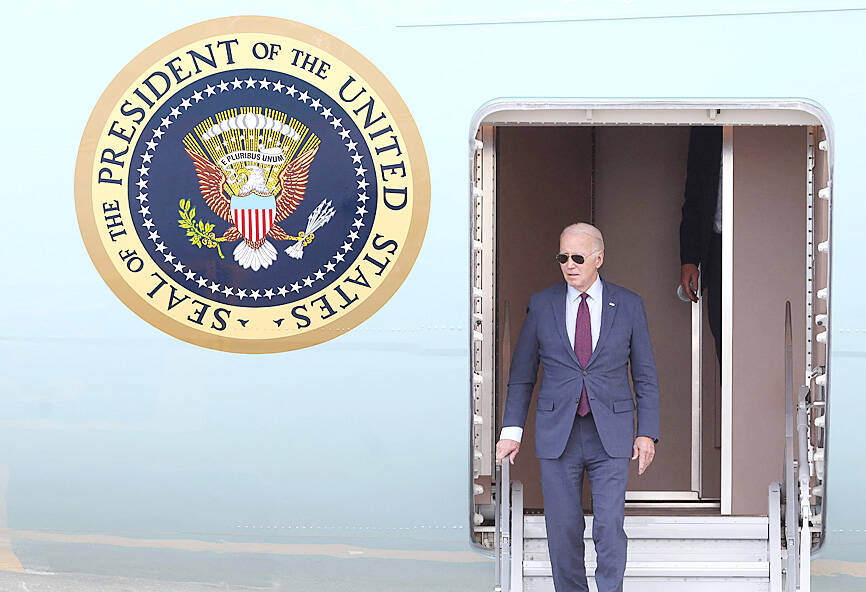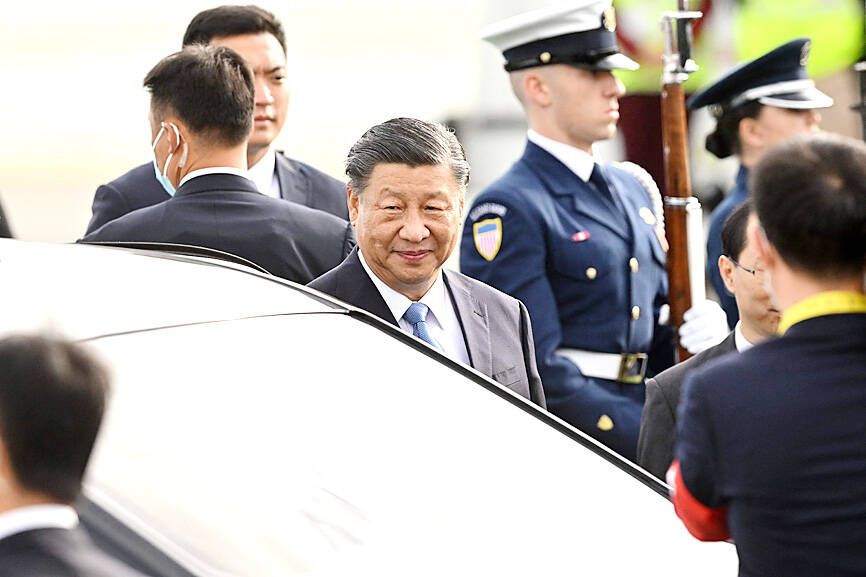US President Joe Biden on Tuesday said that China has “real problems,” speaking at a fundraiser in San Francisco on the eve of an eagerly awaited meeting in the US city with Chinese President Xi Jinping (習近平).
The leaders of the world’s two largest economies are to meet on the sidelines of the APEC summit in California for their first encounter in a year as trade tensions, sanctions and the question of Taiwan have fueled quarrels between Washington and Beijing.
Biden, who, like Xi, arrived in San Francisco on Tuesday, has characterized the meeting as a chance to right ties that have floundered over the past few years.

Photo: AFP
“President Xi is another example of how re-establishing American leadership in the world is taking hold. They’ve got real problems,” he told a fundraising event late on Tuesday, hours ahead of his talks with Xi.
He did not elaborate.
Earlier, the president told reporters at the White House before heading to San Francisco that the US is “not trying to decouple from China. What we’re trying to do is change the relationship for the better.”

Photo: AFP
Asked what he hoped to achieve at the meeting, he said he wanted “to get back on a normal course of corresponding; being able to pick up the phone and talk to one another if there’s a crisis; being able to make sure our [militaries] still have contact with one another.”
However, Biden also said that the US is wary of investing in China due to Beijing’s business practices.
“I’m not going to continue to sustain the support for positions where if we want to invest in China, we have to turn over all our trade secrets,” he said.
Ahead of the meeting between the two leaders, China and the US yesterday pledged to work more closely together to fight global warming, declaring the climate crisis “one of the greatest challenges of our time.”
The announcement further fueled hopes that the two nations could mend relations.
In a joint statement following climate talks in the US, they pledged to make a success of the COP28 UN climate summit.
They also recommitted to the 2015 Paris climate accord goals of holding global warming to “well below” 2°C, while pursuing efforts to limit the increase to 1.5°C.
“The consensus reached between the US and China is a significant moment ahead of COP28,” said Sultan Ahmed al-Jaber, president of the conference set to take place in Dubai at the end of the month.
“It clearly signals that despite global challenges, COP28’s call for climate action is uniting Parties and raising ambition,” he said in a statement.
However, David Waskow, director of the World Resources Institute’s International Climate Initiative, said it was “disappointing that the two nations said nothing about the need to rapidly transition away from fossil fuels this decade, which will be a central issue at the COP28 summit.”

AT RISK: The council reiterated that people should seriously consider the necessity of visiting China, after Beijing passed 22 guidelines to punish ‘die-hard’ separatists The Mainland Affairs Council (MAC) has since Jan. 1 last year received 65 petitions regarding Taiwanese who were interrogated or detained in China, MAC Minister Chiu Chui-cheng (邱垂正) said yesterday. Fifty-two either went missing or had their personal freedoms restricted, with some put in criminal detention, while 13 were interrogated and temporarily detained, he said in a radio interview. On June 21 last year, China announced 22 guidelines to punish “die-hard Taiwanese independence separatists,” allowing Chinese courts to try people in absentia. The guidelines are uncivilized and inhumane, allowing Beijing to seize assets and issue the death penalty, with no regard for potential

STILL COMMITTED: The US opposes any forced change to the ‘status quo’ in the Strait, but also does not seek conflict, US Secretary of State Marco Rubio said US President Donald Trump’s administration released US$5.3 billion in previously frozen foreign aid, including US$870 million in security exemptions for programs in Taiwan, a list of exemptions reviewed by Reuters showed. Trump ordered a 90-day pause on foreign aid shortly after taking office on Jan. 20, halting funding for everything from programs that fight starvation and deadly diseases to providing shelters for millions of displaced people across the globe. US Secretary of State Marco Rubio, who has said that all foreign assistance must align with Trump’s “America First” priorities, issued waivers late last month on military aid to Israel and Egypt, the

‘UNITED FRONT’ FRONTS: Barring contact with Huaqiao and Jinan universities is needed to stop China targeting Taiwanese students, the education minister said Taiwan has blacklisted two Chinese universities from conducting academic exchange programs in the nation after reports that the institutes are arms of Beijing’s United Front Work Department, Minister of Education Cheng Ying-yao (鄭英耀) said in an exclusive interview with the Chinese-language Liberty Times (the Taipei Times’ sister paper) published yesterday. China’s Huaqiao University in Xiamen and Quanzhou, as well as Jinan University in Guangzhou, which have 600 and 1,500 Taiwanese on their rolls respectively, are under direct control of the Chinese government’s political warfare branch, Cheng said, citing reports by national security officials. A comprehensive ban on Taiwanese institutions collaborating or

France’s nuclear-powered aircraft carrier and accompanying warships were in the Philippines yesterday after holding combat drills with Philippine forces in the disputed South China Sea in a show of firepower that would likely antagonize China. The Charles de Gaulle on Friday docked at Subic Bay, a former US naval base northwest of Manila, for a break after more than two months of deployment in the Indo-Pacific region. The French carrier engaged with security allies for contingency readiness and to promote regional security, including with Philippine forces, navy ships and fighter jets. They held anti-submarine warfare drills and aerial combat training on Friday in